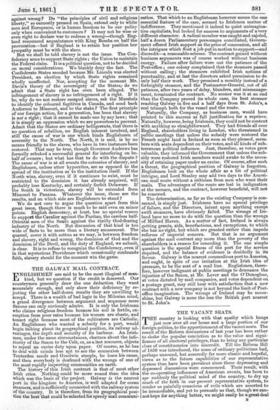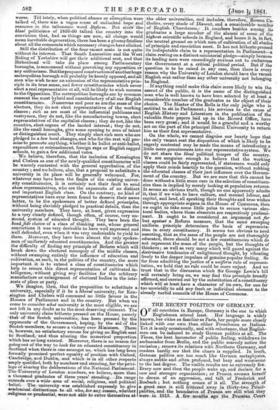THE VACANT SEATS. T HE country is looking with that apathy
which hangs just now over all our home and a large portion of our foreign politics, to the apportionment of the vacant seats. The result of the Reform discussions of last year has been rather to shake the popular conviction as to the value and signi- ficance of all electoral privileges, than to bring any particular class of constituencies into discredit. Till the Reform Bill of 1859 was introduced, the mass of ordinary politicians had, perhaps unsound, but assuredly far more elastic and hopeful, views as to the future capabilities of our representative system than have been prevalent since those depressing and depressed discussions were commenced. Their result, with the co-operating influences of American events, has been to age suddenly the political mind of the country, to dry up much of the faith in our present _representative system, to render us painfully conscious of evils which are asserted to be irremediable, and yet to persuade us that, though we can- not hope for anything better, we might easily be a great deal • worse. Till lately, when political abuses or corruption were the older universities, and includes, therefore, Roman Ca- talked of, there was a vague sense of unlimited hope and resource in the talismanic word Reform. But sinde the blase politicians of 1859-60 talked the country into the conviction that, bad as things are now, all change would mean inevitable degeneration, there has been a gloomy fatalism about all the comments which necessary changes have elicited. Still the distribution of the four vacant seats is not quite without its interest. That South Lancashire and the West Riding of Yorkshire will get their additional seat, and that Birkenhead will take its place among Parliamentary boroughs, is announced without provoking any opposition or any enthusiasm. Buttheproposed constructionof•anotherhuge metropolitan borough will probably be keenly opposed, and all men who wish to see an extension of the representative prin- ciple in its true sense, and fewer, constituencies which never elect a real representative at all, will be likely. to wish success to the Opposition. The metropolitan boroughs are by common consent the most hybrid and unsatisfactory of all our English constituencies. Numerous and poor as are the mass of the electors, they do. not elect representatives of the working classes ; rich as are most of the influential publicans and vestrymen, they do not, like the manufacturing towns, elect representatives of the capitalist classes ; they do not, like the countiea, elect organs of the landed interest ; they do not, like the small boroughs, give some opening to men of talent or distinguished merit. They simply elect rich men who are pledged to a few local changes, and who for the rest will pro- muse to promote anything, whether it be ballot or anti-ballot, expenditure or retrenchment, foreign rags or English ragged schools, to gain a few additional votes. We believe, therefore, that the inclusion of Kensington and Chelsea as one.of the newly-qualified constituencies will be warmly contested - with the general approbation of the .country ; and we believe, also, that a proposal to substitute a university in its place will be generally welcomed. For, whatever may have been the faults of the existing univer- sity constituencies, it is certainly not their fault to send sham representatives, who are the exponents of no distinct and important English class. On the contrary, no kind of repreaentativea have ever .been found to deserve• their name better, to be the spokesmen of better defined principles, without being slavishly pledged to practical details, than the university members. They have, at. least, given expression to a very clearly defined, though often, of course, very un- sound, system of educated thought.. They have been the bond fide choice of a class of thinking men, whose general convictions it was very desirable have well expressed and well defended, even when it was very undesirable to yield to them. Moreover, they have been almost, the only spokes.. men of uniformly educated constituencies. And the greater the difficulty of finding any principle of Reform which will break down the electoral monopoly of the middle classes, without swamping entirely tho influence of education 'and cultivation, tal3 'such,. in,the politics of the country, the more important it is to extend a class of constituencies which help to secure this direct representation of cultivated in- telligence, without giving any, facilities for the arbitrary manufacture or enlargement of electoral .bodies in the inte- rests of place or party. We imagine, then, that the proposition to substitute a university, especially if it be a liberal university, for Ken- . aington and Chelsea will command no little favour in the Houses of Parliament and in the country. But when we come to consider what university is the most eligible, we are not left in any doubt as to the most deserving claimant. The only university claim-hitherto pressed on the House, namely 'that of the Scotch universities, has. been pressed by. the -opponents of the Government, hoping, by the ai& of the Scotch-members, to secure a victory over Ministers. There is, however, no satisfactory excuse for giving an English seat to Scotland, and thus altering the numerical proportion which has soling existed. Moreover, there is no reason for going out of the way to look for an educated constituency in Scotland when there is one amongst us, which has long been formally promised perfect equality of position with Oxford, Cambridge, and Dublin, and which .is in all other respects amply qualified, both by numbereand standing, for the privi- lege of sharing the deliberations of the National Parliament. The•University of London numbers, we believe, more than a thousand graduates of three years' standing. Its range extends over a wide area of social, religious, and political belief.. The university was established expressly to give academical distinctions to all who, for any reason, whether religious orprudential, were not able to enter themselves at tholics, every shade of Dissent, and a considerable number of English. Churchmen,. It numbers besides among its graduates a large number of the alumni of some of the .highest scientific schools in England, and hence it is, in fact, the neutral ground on which men of cultivation of all shades of principle and conviction meet. It hns not hitherto pressed its indisputable claim to a representation in Parliament—a claim resting on a distinct ministerial pledge—simply because its leading men were exceedingly anxious not to embarrass the Government at a critical political period. But if the question is to be raised in any case, then there is every reason why the University of London should have the vacant English seat rather than any other university not belonging to England.
. If anything could make this claim more likely to win the assent of the public, it is the name of the distinguished man who is well known to have been selected by at least a considerable number of the graduates as the object of their choice. The Master of the Rolls is the only judge who is entitled to sit in Parliament ; his services to the cause of English History and Literature in the publication of the valuable State papers laid up in the Record Office, have been very great; and it would be a graceful and a worthy act on the part pf the principal liberal University to return him as their first representative. On the whole, we cannot disguise our hearty hope that the only vacant seat the disposition of which is likely to be eagerly contested may be made the means of introducing a .little more genuineness, into our representative system. Wo do not share the blase political temper of the country. We are sanguine enough to believe that the working classes could be fairly represented, if statesmen would only apply their minds heartily to the question, without robbing the educated classes of their just influence over the Govern- ment of the country. But we are sure that this cannot be done without a little more care in the selection of constituen- cies than is implied by merely looking at population returns. It seems an obvious truth, though no one apparently admits it; that if we wish to have culture, and manual labour, and capital, and land, all speaking their thoughts and true wishes through appropriate organs •in the House of Commons, then we ought to take some little pains to secure various elec- toral bodies, where these elements are respectively predomi- nant. It ought to be considered._ an argumept not for but against a Reform measure, that the same sweeping uniform . principle determines the basis of representa- tion in every constituency. It seems too obvious to need asserting, that as the mass of the people are not thoroughly educated, there should be not a few constituencies-which do not represent the mass of the people, but the thoughts of thinkers ; as well as very many which will guard against the doctrinaire tendencies of enlightened thought, by vibrating freely to the deeper impulses of genuine popular feeling. So far from admitting the justice of a uniform rule of represen- tation, we hold that no rule could be more unjust. And we trust that in the discussion which Sir George Lewis's bill will certainly bring on, we may find this principle broadly affirmed, and carried out by the substitution of a constituency which will at least have a character of its own, for one far too unwieldly to add any fresh or individual element to the already turbid councils of the House of Commons.































 Previous page
Previous page